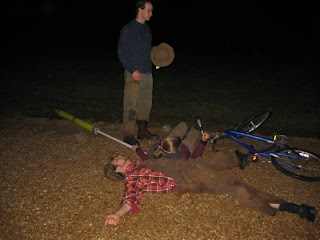John Krakauer wrote about his Mt. Everest expedition in Into Thin Air, which is about as fine a book as I’ve read in the past five years. To summarize, it was really cold and there wasn’t much oxygen and a storm came up and several people died and several others, Krakauer included, were saddled with a lifetime of guilt for not being able to save them. They knew the risks and climbed anyway – and for what? To say they stood in a particularly high place? When my group set our boots to climbing Kilimanjaro, reached 19,000 feet then had to turn around because a member of the group developed high-altitude cerebral edema – the swelling of the brain caused by high altitude, accompanied by hallucinations, a loss of rational thought, and a loss of motor skills – once we got her down safely, I didn’t give a tinker’s damn about the summit. Some other folks wanted to take another shot at the top, and if conditions had permitted the climb, I’d have gone with them just for the hell of it. But as for summiting, I didn’t much care. Seven years later, I still don’t.
These reflections, as I drove through the night listening to the Into Thin Air audiobook and reacquainting myself with Krakauer’s writing style, made me feel mature. Here was a story of a bunch of sure-enough grownups, with wives, husbands, and children, taking absurd risks to achieve an objective with which I was unimpressed. I smiled to myself and remembered Harvey Manning’s line from Walking the Beach to Bellingham: “To be sure, long lines of tourists plodding their way up the path to the top of Everest interest me. So do ants.” I stood with Harvey.
But as so often happens with self-righteousness, the next thought was a deflater. It wasn’t the risks that bothered me. It’s just that I didn’t much care about their objective.
True, mountain climbing doesn’t make a damn bit of sense. But then, I have long enjoyed duck hunting. I remember getting up before dawn on frigid January mornings with my buddy Ben where we shivered, dressed hurriedly, then looked at the waders. One pair leaked and the other didn’t and we didn’t know which was which so we’d each grab a pair and wade into the beaver pond with our fingers crossed. And I remember standing stock-still, shotgun in hand, as icy water poured down my leg and pooled around my foot thinking, this doesn’t make a damn bit of sense. But we went duck hunting again and again and I loved it. I remember mounting a bicycle at one end of a sandy strip of beach, a foam-covered eight-foot-long PVC pipe in my hand, and staring at a buddy a hundred yards distant with his own bicycle and his own foam-covered pipe. Then we’d pedal toward each other as fast as we could go, stabbing at one another with our lances then colliding with thumps, groans, banging metal and spraying sand. I remember examining the bruises on my chest and thinking, this doesn’t make a damn bit of sense. But I jousted again, and I loved it.
I tried to get a college buddy of mine to go camping once. “Jeb,” he said, “I could leave behind my warm bed, my TV in the morning, the snacks in the cabinet, and the beer in the refrigerator. I could leave all of civilization behind and go walk around in the woods. I could handle it. But why would I do that?” His point, I think, was this: it didn’t make sense.
Often, the best parts of living just don’t make sense. Joy and sensibility are frequently at odds. Something’s gone wrong: insomuch as enjoying one’s life is a sensible goal, one of these concepts must have gotten off track. Joy or sensibility. One of them is amiss. It’s an easy choice. Having determined that “sense” is defective, I have resolved to jettison it at every opportunity. :)
The aftermath of a joust.






No comments:
Post a Comment